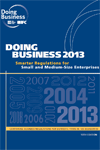Overview
An institutional environment characterized by openness and transparency is of central importance not only for private markets but also for the effective and efficient management of public resources. Access to information can empower citizens to monitor the quality of government services and the use of public resources. This case study investigates how much transparency and access to information can affect the quality of government services relevant for businesses.
The World Bank Enterprise Surveys suggest that there is much room for improvement in service quality and accountability in business regulation. A sizable body of literature already attests to the importance of information in ensuring the quality of public services in such areas as health, sanitation and education. But thus far little attention has been paid to this role of information in the administrative branches of government that implement business regulation, such as company and property registries, building departments and power distribution utilities.
This study fills this gap by presenting new data that speak to the efforts at transparency made by government agencies tasked with implementing business regulation. The data capture how governments make basic regulatory information such as fee schedules available to businesses. The new data on the accessibility of regulatory information, collected between January and August 2012, measure how easy it is to access fee schedules for 4 regulatory processes in the largest business city of an economy: incorporating a new company, obtaining a building permit, connecting a business to electricity and transferring property. The new data can be found at http://www.doingbusiness.org/data/transparency.
Main Findings
- It is in OECD high-income economies that businesses can expect the most consistently easy access to regulatory information through websites or printed brochures.
- Access to fee schedules for regulatory processes is most limited in Sub-Saharan Africa and the Middle East and North Africa, where it is more common to have to meet with an official to obtain this information.
- The accessibility of regulatory information varies with income level and internet penetration, but resources are not the only explanation. Access to regulatory information is easier in economies that are characterized by greater political accountability and that guarantee greater political and civil rights.
- Economies providing greater access to regulatory information tend to have more efficient regulatory processes and lower regulatory compliance costs.
- Access to basic regulatory information is also positively associated with the trust the public places in its government. Where regulatory information is more consistently accessible, businesses perceive their government as being better able to formulate and implement sound policies and regulations that permit and promote private sector development (figure 8.5).

